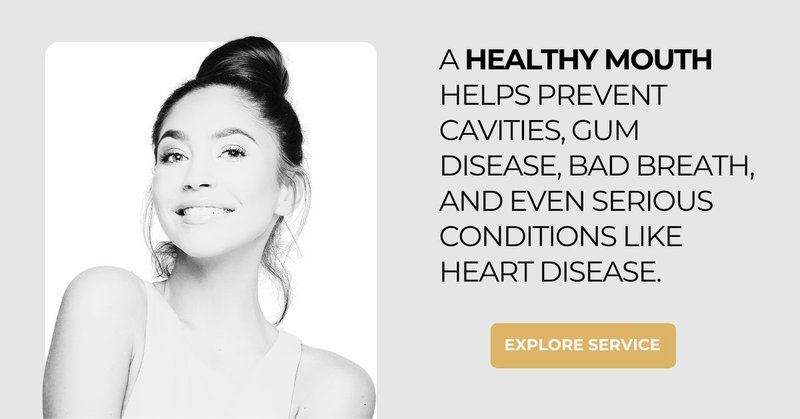If you skip brushing, you’re not just risking a cavity—you’re taking a chance with your health. Bleeding gums, bad breath, and tooth loss might only be the beginning. Oral bacteria can affect your heart, lungs, and other organs. At Smile Dailey Dental, we often see how small dental issues grow quickly, and how the effects of poor oral hygiene can reach far beyond your teeth.
Key Takeaways:
- Early signs of tooth decay include white spots, pain while chewing, and visible holes.
- Plaque hardens into tartar in 2–3 days, causing gum irritation and gingivitis.
- Gingivitis can be reversed; periodontitis leads to bone loss and possibly tooth loss.
- Bacteria from gum disease can enter the bloodstream and contribute to heart attacks, strokes, and pregnancy issues.
- Poor oral hygiene can worsen diabetes, arthritis, and immunity-related health problems.
- Abscesses from untreated decay can lead to serious infections.
- Oral thrush may develop from yeast overgrowth in dry mouths and weakened immune systems.
- Seniors and people with special needs face more oral health issues.
- Losing teeth affects speech, nutrition, self-esteem, and daily comfort.
- Poor oral health is linked to memory loss, sinus infections, and oral cancer.
- Brushing twice and flossing once a day helps prevent tooth decay and other illnesses.
- Fluoride (in toothpaste or tap water) strengthens enamel and helps prevent cavities.

The Far-Reaching Effects of Poor Oral Hygiene
At Smile Dailey Dental, we believe that your smile is more than just what people see—it’s a window into your overall health. The effects of poor oral hygiene stretch far beyond cavities and bad breath. From painful infections to serious health risks, neglecting your teeth can impact your confidence, comfort, and even your heart. That’s why learning about the early warning signs and long-term consequences is essential to living your healthiest life.
Tooth Decay and Cavities Develop Silently But Quickly
One of the first and most common signs of poor oral hygiene is tooth decay. Before you feel any pain, you might notice:
- Small white spots on your teeth
- Pain when chewing
- Tiny holes or pits
These are early signs of cavities. Initially, cavities form when plaque—a sticky film of bacteria—feeds on sugar and creates acid. Consequently, that acid eats away at your enamel, which is your teeth’s hard outer layer. If left untreated, these little spots eventually grow into deeper decay, leading to pain, infections, or tooth loss.
Moreover, children are also vulnerable. In fact, cavities are among the most common childhood diseases. Therefore, to prevent them, brush every morning and night with fluoride toothpaste and limit sugary snacks and drinks.
Plaque Becomes Tartar and Irritates Gums
Plaque doesn’t just stop at cavities; in fact, if not brushed away, it hardens within days into tartar, which can only be removed by a dental professional. Tartar forms especially around the gumline and feels rough.
As tartar builds up, it subsequently irritates your gums and causes:
- Swelling
- Redness
- Bleeding during brushing or flossing
These are signs of gingivitis, the earliest phase of gum disease. When gums are irritated, they consequently pull away from the teeth, creating gaps where more bacteria hide. Therefore, bleeding gums are your body’s warning sign—don’t ignore it.
Gingivitis Can Become Periodontitis and Permanently Damage Your Smile
The effects of poor oral hygiene become more serious when gingivitis turns into periodontitis. This advanced gum disease affects more than your gums—it attacks the bone that holds your teeth in place.
Unlike gingivitis, which is reversible with consistent brushing, flossing, and dental cleanings, periodontitis causes long-term damage. You may notice:
- Loose teeth
- Gaps between teeth and gums
- Receding gums
Once bone loss begins, it’s very difficult to rebuild. Periodontitis can even cause teeth to fall out. Worse, these bacteria can spread beyond your mouth, increasing your risk of systemic health issues, as noted by the CDC.
Bad Breath May Be a Sign of Bigger Problems
Chronic bad breath, or halitosis, often signals more than just a skipped brushing session. It can mean bacteria are thriving in your mouth, especially between your teeth or on your tongue.
These bacteria break down food particles and consequently release sulfur gases that smell foul. Additionally, a dry mouth—often caused by medications or dehydration—can exacerbate the problem. Therefore, simple steps like flossing, tongue cleaning, and using antimicrobial mouthwash can help remove odor-causing bacteria. However, if bad breath persists, it’s crucial to ask your dentist about deeper issues.
Abscessed Teeth: Painful and Dangerous
An abscess is a pocket of pus that forms when bacteria infect the inside of your tooth or gum.
It typically begins with untreated tooth decay, allowing bacteria to reach the soft pulp inside. As a result, symptoms may include:
- Severe toothache
- Swelling in the face or jaw
- Fever
Consequently, this infection can spread to the jawbone or bloodstream, leading to emergencies. Regular brushing and dental checkups can prevent infections before they become serious.
Oral Thrush: A Common Yet Overlooked Infection
Oral thrush is a yeast infection that causes white patches in the mouth or throat. While everyone has some Candida yeast, poor oral hygiene, dry mouth, or certain medications can lead to overgrowth.
Those most at risk include:
- Infants and seniors
- People with weakened immune systems
- Denture wearers or smokers
Thrush can cause pain, burning, and difficulty eating. Keeping your mouth clean and moist reduces your risk significantly.
You can learn more about oral infections from the World Health Organization.
Tooth Loss Starts With Small Neglect
Tooth loss doesn’t happen overnight. Rather, it begins with ignored plaque, untreated cavities, or gum disease. Over time, these issues gradually wear away the structures that support your teeth, including both bone and soft tissue. As a result, teeth may eventually feel loose, shift out of place, or fall out entirely. This, in turn, affects several aspects of daily life, including:
- Chewing and digestion
- Speech clarity
- Confidence and appearance
Therefore, maintaining good oral hygiene habits and scheduling regular dental visits are crucial in preventing this downward spiral.
The Effects of Poor Oral Hygiene: Damaged Teeth Make Daily Life Harder
Tooth pain and decay inevitably make chewing difficult, which can consequently lead to poor nutrition, fatigue, and digestive issues. As a result, some people may chew only on one side to avoid discomfort. This behavior, however, strains the jaw and can lead to TMJ disorders.
Moreover, missing front teeth can significantly alter speech, especially with S and TH sounds, while also affecting self-esteem. Consequently, people may avoid talking, smiling, or socializing. These are real, daily effects of poor oral hygiene.
The Mouth-Body Connection: Oral Health and Systemic Disease
Your mouth isn’t an isolated system. Oral bacteria can enter your bloodstream and travel to other organs, increasing your risk for serious health problems.
Gum Disease and Heart Health
Bacteria from gum infections cause inflammation in the blood vessels. This can:
- Harden arteries
- Increase stroke risk
- Contribute to heart attacks
According to the CDC, people with severe gum disease are nearly twice as likely to have heart disease.
Diabetes and Oral Health
Gum infection raises blood sugar levels, which complicates diabetes management. In turn, high blood sugar feeds bacteria, worsening gum disease. Breaking this cycle requires treating both conditions together.
Bacteria and the Brain
Germs from your gums can reach the brain, especially if your gums bleed easily. Chronic inflammation may be linked to memory problems and diseases like Alzheimer’s. These effects of poor oral hygiene are still being studied but show a compelling connection.
Certain Populations Face Higher Oral Health Risks
Seniors and Oral Health
Older adults often take medications that cause dry mouth, a key risk factor for decay and thrush. Physical limitations may make brushing or flossing harder. Ill-fitting dentures can also cause sores that lead to infection.
People With Special Needs
Daily brushing and dental visits can be difficult for those with physical or mental challenges. Caregivers must often assist. Accessible dental clinics and adaptive tools can make a big difference.
Kids and School Performance
Children with decay may miss school due to pain or embarrassment. They may avoid smiling or speaking, lowering their confidence and classroom participation. Poor oral hygiene affects learning, nutrition, and even sleep.
Check out the CDC’s dental health data for more insights into these disparities.
Emotional and Social Effects of Poor Oral Hygiene
Your smile affects how others see you—and how you see yourself.
How Dental Issues Impact Confidence
People with visible tooth problems often avoid smiling or speaking. They may worry others are judging them. This can lead to social withdrawal, anxiety, or even depression.
The Confidence-Killing Power of Bad Breath
Halitosis can make people avoid close contact or public speaking. It affects job interviews, relationships, and self-worth.
I once met a teen named Derek who avoided school clubs because of bad breath. With treatment, his health and confidence soared. He even ran for student council—and won.
Children and Self-Esteem
Kids with dental issues may feel ashamed, especially if they’re teased. This impacts how they see themselves and how they interact with others. Early dental care builds not just healthy teeth, but self-respect and social strength.
Pregnancy and the Possible Effects of Poor Oral Hygiene
Gum Disease and Birth Risk
Gum infections during pregnancy can trigger early labor or low birth weight. Bacteria release chemicals that prompt premature contractions. These effects have been confirmed in several studies.
Oral Health and Fertility
Gum inflammation may delay conception by affecting hormone balance. Keeping your mouth healthy supports a healthy pregnancy from the start.
Read more in this research article.
Respiratory and Immune Impact of Poor Oral Health
Mouth Germs and Lung Infections
When you breathe in, germs from your mouth can enter your lungs. In frail or older adults, this can cause pneumonia or bronchitis.
Immune System Strain
Constant gum infection forces your immune system to stay on high alert. This can wear it down, especially in people with other health conditions.
Conditions That Worsen With Oral Neglect
- Diabetes
- Rheumatoid arthritis
- HIV
- Lupus
These illnesses all respond poorly to chronic inflammation from gum disease.
Surprising Effects of Poor Oral Hygiene
Memory Loss Potential
Inflammation from gum disease has been linked to brain decline. Some studies have found gum bacteria in the brains of Alzheimer’s patients.
Sinus Infections From Tooth Decay
Upper back teeth sit near your sinuses. Infections can spread upward, causing chronic sinus pain.
Oral Cancer Risk
Skipping dental care means signs of oral cancer can go unnoticed. Long-term gum inflammation may also increase your cancer risk.
Simple Daily Habits Prevent Big Problems
- Brush twice daily with fluoride toothpaste
- Floss once a day
- Drink water regularly, especially fluoridated tap water
- Use sugar-free gum to boost saliva
- Visit your dentist every six months
These small steps protect not just your teeth, but your whole body.
Take the First Step Toward a Healthier Smile
Ready to improve your health and confidence?
At Smile Dailey Dental, we’re here to help you prevent the effects of poor oral hygiene before they start. Whether you need a routine checkup or a full smile makeover, our experienced team is ready to help.
Contact us today to schedule your appointment and take control of your oral health.

